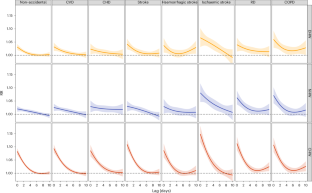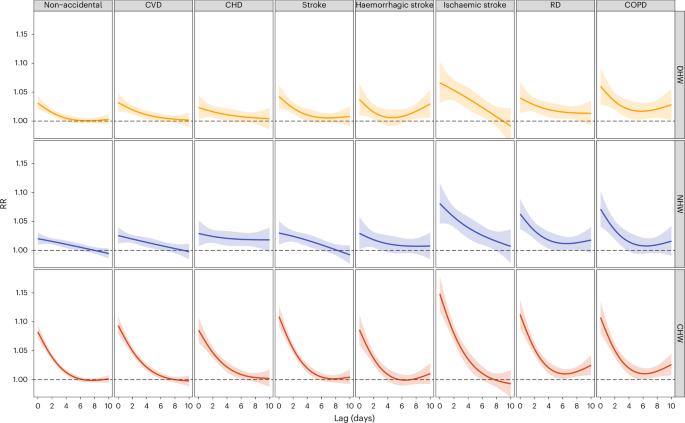气候变化导致复合热浪造成的特定原因死亡风险和负担上升
IF 29.6
1区 地球科学
Q1 ENVIRONMENTAL SCIENCES
引用次数: 0
摘要
全球变暖使白天的热浪转变为夜间热浪和昼夜复合热浪。然而,在气候不断变化、人口不断老龄化的情况下,有关这些热浪造成的特定原因负担的证据却很有限。在这里,通过分析中国 272 个城市的 1,088,742 例非意外死亡,我们发现复合热浪造成的心肺死亡风险和负担明显高于仅白天和夜间热浪,尤其是缺血性中风、慢性阻塞性肺病和夏季气温变化大的地区。预测表明,在中度和高度温室气体排放情景下,到 2090 年代,复合热浪相关死亡率比 2010 年代大幅增加(4.0-7.6 倍),超过夜间热浪(0.7-1.9 倍),与白天热浪相关死亡率下降(0.3-0.8 倍)形成鲜明对比。严格的排放控制情景(共同社会经济路径 1-1.9)可能会逆转大部分热浪相关死亡率的上升。全球变暖和老龄化的叠加扩大了与热浪相关的负担,超过了它们各自影响的总和。我们的研究结果强调了在全球变暖的情况下应对复合热浪的重要性。本文章由计算机程序翻译,如有差异,请以英文原文为准。


Rising cause-specific mortality risk and burden of compound heatwaves amid climate change
Global warming shifts daytime-only heatwaves to nighttime-only and day–night compound heatwaves. However, evidence on the cause-specific burdens of these heatwaves in a changing climate and ageing population is limited. Here, by analysing 1,088,742 non-accidental deaths from 272 Chinese cities, we found that compound heatwaves posed significantly higher cardiopulmonary mortality risks and burdens than daytime-only and nighttime-only heatwaves, particularly for ischaemic stroke, chronic obstructive pulmonary disease and regions with high summer temperature variation. Projections suggested substantial increases in compound heatwave-related mortality (4.0–7.6-fold) by the 2090s relative to the 2010s under medium and high greenhouse gas emission scenarios, outpacing nighttime-only heatwaves (0.7–1.9-fold) and contrasting with decreasing daytime heatwave-related mortality (0.3–0.8-fold). A strict emission control scenario (Shared Socioeconomic Pathway 1-1.9) may reverse most heatwave-related mortality increases. The confluence of global warming and ageing amplifies heatwave-related burdens, outstripping the sum of their individual impacts. Our findings underscore the importance of addressing compound heatwaves amid global warming. The authors analyse data from 272 Chinese cities, projecting that compound heatwaves will cause higher burdens for all major cardiopulmonary diseases than daytime or nighttime heatwaves, especially under scenarios with higher emissions and ageing and in areas with high summer temperature variability.
求助全文
通过发布文献求助,成功后即可免费获取论文全文。
去求助
来源期刊

Nature Climate Change
ENVIRONMENTAL SCIENCES-METEOROLOGY & ATMOSPHERIC SCIENCES
CiteScore
40.30
自引率
1.60%
发文量
267
审稿时长
4-8 weeks
期刊介绍:
Nature Climate Change is dedicated to addressing the scientific challenge of understanding Earth's changing climate and its societal implications. As a monthly journal, it publishes significant and cutting-edge research on the nature, causes, and impacts of global climate change, as well as its implications for the economy, policy, and the world at large.
The journal publishes original research spanning the natural and social sciences, synthesizing interdisciplinary research to provide a comprehensive understanding of climate change. It upholds the high standards set by all Nature-branded journals, ensuring top-tier original research through a fair and rigorous review process, broad readership access, high standards of copy editing and production, rapid publication, and independence from academic societies and other vested interests.
Nature Climate Change serves as a platform for discussion among experts, publishing opinion, analysis, and review articles. It also features Research Highlights to highlight important developments in the field and original reporting from renowned science journalists in the form of feature articles.
Topics covered in the journal include adaptation, atmospheric science, ecology, economics, energy, impacts and vulnerability, mitigation, oceanography, policy, sociology, and sustainability, among others.
 求助内容:
求助内容: 应助结果提醒方式:
应助结果提醒方式:


